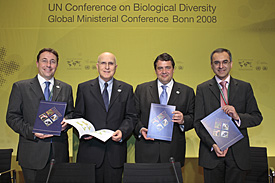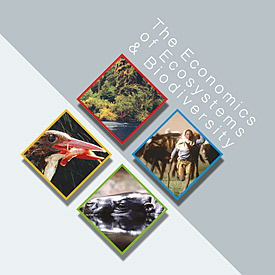The Economics of Ecosystems and Biodiversity (TEEB)
Researchers:
Duration: 2007 - 2010
Outline:
‘The Economics of Ecosystems and Biodiversity’ (TEEB) is an initiative that aims to draw attention to the global benefits of biodiversity and to the social and economic costs of biodiversity loss and ecosystem degradation.
Our planet produces a range of ecosystem services essential for human well-being, such as the provision of drinking water, food, fibre and medicines. The sequestration of carbon and the eminent cultural and spiritual importance of natural landscapes are also considered as ecosystem services. Despite our dependence upon them, we often fail to consider these benefits in policies and management decisions affecting our environment. Furthermore, this failure has the most serious impacts on the poor who have little means to compensate for any loss of ecosystem services which they rely on.
The study will bring together state-of-the-art research on assessing and valuing ecosystem services in different biomes, as well as their integration in environmental policy processes. To ensure a needs-oriented dissemination of findings, several reports are planned, geared towards different audiences, including academia, decision makers at various policy levels, the general public and the business sector.
The G8+5 Environmental Ministers initiated TEEB in Potsdam in 2007. Several EU governments and the European Commission provide funding for this study.
TEEB is a cooperative effort of research institutes across the globe, mainly from India, the Americas and Europe, led by Pavan Sukhdev from UNEP.
The UFZ team is contributing to various reports and is responsible for the scientific coordination between the TEEB study teams.
TEEB has launched Calls for Evidence for each of the reports: Please consult the study’s main page and contribute opinions, expertise and case studies.

The TEEB Interim Report was presented at the 9th Conference of the Parties of the Convention on Biological Diversity in May 2008 in Bonn. The report provided strong evidence for significant global and local economic losses and human welfare impacts attributable to the ongoing losses of biodiversity and degradation of ecosystems. It also highlighted important issues which had not hitherto occupied ‘centre-stage’, such as the correlation between biodiversity/ecosystem losses and the persistence of poverty, as well as the importance of openly recognizing the role of ethics in our treatment of risks, uncertainty and discount rates to assess future costs and benefits.
In September 2009, TEEB published a Climate Issues Update adressing some major issues on the link between climate change policies and ecosystem's role in mitigtatin and adaptation of climate change.
Details can be found in the press release.

In Novmeber 2009, TEEB published its first main report TEEB for International and National Policy Makers, see
If you would like to contribute to TEEB, please check the Calls for Evidence (see above).
For any further questions please contact us:
Partners:
- European Commission DG Environment
- German Federal Ministry for the Environment, Nature Conservation and Nuclear Safety (BMU)
- U.K. Department fro Environment Food and Rural Affairs (defra)
- United Nations Environment Programme (UNEP)
- Indian Institute of Technology Bombay (IITB)
- Institute for European Environmental Policy (IEEP)
- International Union for Conservation of Nature (IUCN)
- Organisation for Economic Co-operation and Development (OECD)
- University of Liverpool
- Convention on Biological Diversity (CBD)
